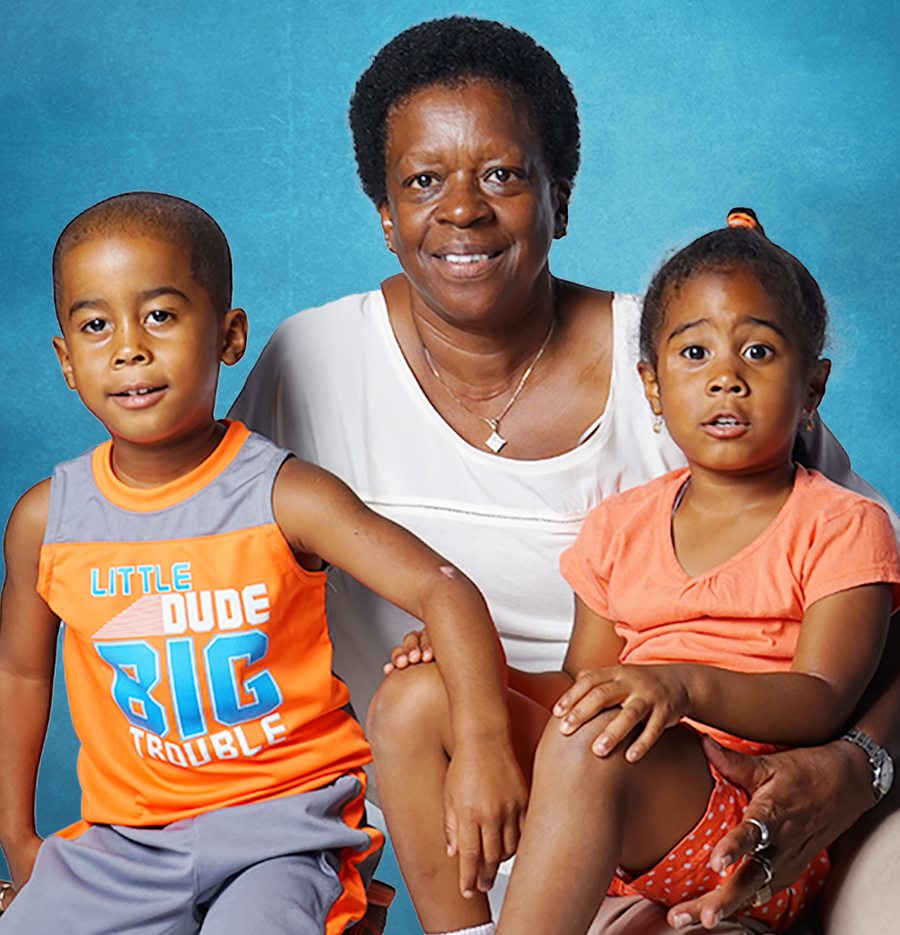Next of Kin
Nearly 355,000 children in Florida live with their grandparents. Another 121,758 children live with relatives other than their parents. Kinship care has its challenges, but rewards are immense, say two local families.
Retirement for Rhonda Jones, of Clermont, isn’t what she expected, and not because she didn’t plan for it. Rhonda, a retired New York City policewoman, is among the thousands of grandmothers in Florida who care for their grandchildren. At 64, she is raising her deceased son’s 3-year-old twins.
“I don’t mind taking care of them,” she said. “It is fun and rewarding, although this wasn’t how I planned to spend my retirement. I focus on doing things with them. It’s not their fault they are here, and I want them to have a better life.”
Rhonda’s grandchildren — a boy and girl she’s cared for since they were infants — are among more than 23,000 children who live with grandparents in Florida’s Fifth Judicial Circuit, which includes Lake and Sumter counties.
“I can’t believe the number of folks in the same boat as I am,” she said. “I’ve made friends with many other grandparents and kinship relatives through a weekly support group meeting.”
The Lake County Kinship Care Educational Support Group is sponsored by Kids Central, Inc., a community-based agency that works with the Florida Department of Children and Families (FDCF) to place children in foster or kinship care. The group helps grandparents and other relatives navigate the challenges that come with taking in a family member’s child. It meets Monday evenings at New Life Presbyterian Church in Fruitland Park.
“It’s a big change to take in a child. Our support groups offer information and counseling,“ said Michelle Mongeluzzo, director of prevention services for Kids Central. “Our goal is to help stabilize these families so that the children do not have to be given over to strangers in foster care.”
Placing children with a family member or a close family friend is the optimal solution when children must be removed from their homes. Children are able to maintain family connections, often alleviating some of the loneliness and disconnectedness they feel when placed in foster care. In addition, a family relative is empowered to make decisions instead of giving that responsibility to a stranger.
The issues experienced by relative caregivers often are more challenging than those faced by non-relative caregivers. Finances are first and foremost. Caregiving relatives get less financial assistance or, in some cases, receive no money from the state for the child’s daily living expenses. Caregiving relatives can get $181 a month per child or $242 for two children through Access Florida, if they qualify. That’s compared to a daily stipend of $17 per day — a little over $500 a month — for foster care providers.
Unfortunately, Rhonda does not qualify for Access Florida funds because she only has temporary custody. Although the twin’s mother is unable to care for the children, she has not signed adoption papers for Rhonda to legally adopt them. Rhonda eventually was able to get Medicaid for the children’s health needs.
Medical issues for children in kinship care are another challenge, especially for young families like Avery and Justin Finotti, who are in the process of adopting her older sister’s daughter. The Eustis couple already had two children of their own when Avery’s sister gave birth in March 2014.
“My sister was estranged from the family because of her drug problems, and when I heard she was pregnant I said, ‘I don’t even want to know about it,’” Avery said.
Things changed, however, when Avery and another sister went to the hospital to see the baby.
“She was beautiful, and I immediately decided I would do whatever I could for her,” Avery remembered.
Born with a rare liver disorder, baby Ella spent two weeks in the hospital before going home with the Finottis. The baby’s paternal grandmother had called Avery and asked her to help. The grandmother had been contacted by FDCF, but she already was raising one of her son’s other children and couldn’t take on another.
“The grandmother gave me the social worker’s name, and I went from there,” Avery said. “It’s been a challenge because of Ella’s medical problems, which included a liver transplant, but I would say taking my niece has been the most rewarding thing I’ve ever done.”
Dealing with the range of emotions experienced by families is another challenge no one can ignore. Anger, confusion and even grief are part of the process.
“You have to show a lot of mercy and grace for the family member who made bad decisions and caused the child to be without a biological parent,” Avery said. “I’ve come a long way with that and it’s helped me love my niece even more.
“There is a grieving process as well,” she added. “I had to come to the realization that my sister was not going to play a role in her daughter’s life.”
Rhonda also has experienced a range of emotions from frustration over dealing with custody hearings to daily joys like having her grandson look at his late father’s childhood photo and recognize how much they resemble each other.
“I enjoy being with them,” she said about the twins. “How many other people my age can say the last movie they saw was ‘Alvin and the Chipmunks?’”
Her grown children in New York and Chicago supported her decision to raise the twins by helping with gifts and money. They also have agreed to take the twins should anything happen to Rhonda. In the meantime, Rhonda gets a lot of emotional support from friends and her church.
Despite the challenges of starting over with new babies, both Rhonda and Avery agree the rewards are immense.
“You never know what good can come out of a bad situation,” Avery said. “I am so glad to have Ella be a part of our family.”

